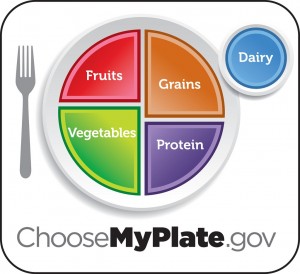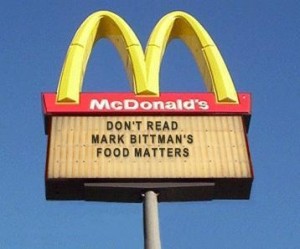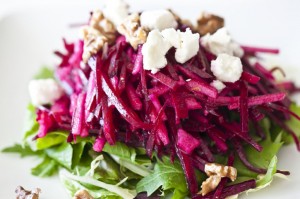
Photo: Beautiful People ATX/Flickr
The nation’s first-ever Food Day came and went on Monday. Where were you? What did you eat?
Quid pro quo. We at Public Radio Kitchen began last Friday with Food Day events, ate our way through the weekend, then visited both the Musuem of Science’s screening of Chris Taylor’s “Food Fight” and the Boston Food Swap’s community potluck Monday evening.
PRK’s Elizabeth Hathaway has already shared with you her experience at the Swap potluck. Anna Thorup will stir the pot soon with a run-down of “Food Fight” and the ensuing panel discussion. I, on the other hand, want to fill you in on my own participation in Food Day, beginning with the awesome Tedx Food Policy event that took place on Friday, Oct. 21st, at Harvard Law School (HLS).
Friday, October 21: TEDxHarvard Law Forum on Food Policy
This conference was jointly sponsored by The Harvard Food Law Society and the smart new Boston-based initiative Let’s Talk About Food, founded by Louisa Kasdon. Together they organized the forum into three sessions broadly labeled “Health,” “Supply” and “Demand.” Each session consisted of three individual speakers and a moderated panel discussion in which audience members could directly question the panel members.
The session on “Supply” was fascinating. Susan Prolman of the National Sustainable Agriculture Coalition (NSAC) spoke first, and focused her talk on the 2012 Farm Bill. THAT was an eye-opener. Imagine, fruits and vegetables are termed “speciality crops” in this legislation (speciality crops!!!) while commodity crops such as corn, soy, etc., receive the lion’s share of government subsidies. The bill as it stands incentivizes mono-cropping, an inherent risk to farmers and the environment, so she argued. Meanwhile, the proposed monetary support flies in the face of the government’s own recommendations for a healthy daily diet — see MyPlate (below)– half of which should consist of said “speciality crops.” Yes, fruits and vegetables. But, produced where? By whom? Legitimate questions, if we’re all to eat this way — presuming, that is, that we all have access to healthy produce (we don’t).

Photo: USDAgov/Flickr
Emily Broad Leib, an HLS alum and recent “Delta Fellow,” spoke on her work in Mississippi to facilitate sales at local farmers markets (by eliminating the taxes burdensome to small producers) and increase the public’s access to such markets. She seems super-committed and super-energetic — a hopeful mix, seeing she is back in Cambridge co-teaching a HLS seminar on ‘Health Law and Policy’ as it relates to food and is serving as a Fellow at the school’s Health Law and Policy Clinic. Go, Emily.
John Piotti, Executive Director of Maine Farmland Trust, gave a spirited talk on the current state of New England farmland and his hopes for future growth and local sourcing. He described New England as blessed: land, workers, a conducive climate, adequate sunshine and water. But Piotti’s rosy outlook must be tempered, I think, by the comments of MDAR Commissioner Scott Soares, who spoke yesterday after the MOS screening of “Food Fight.” Massachusetts, Rhode Island and Connecticut are some of the most expensive states in the U.S. to farm, according to Soares. How to reconcile the two?
The session that followed hit upon “Demand.” Former Trader Joe’s exec Doug Rauch presented a new for-profit business concept that would address food insecurity: take high-quality, salvageable food thrown away — in billions of pounds — by supermarkets and re-sell it at low cost in under-served communities. Why sell and not donate? As Rauch explained, for reasons of dignity many people won’t take meal ‘hand-outs.’ Also, the creation of a new non-profit might create competition for already limited fund-raising dollars to the detriment of the very communities it’s trying to serve. Rauch argued persuasively that America’s current paradox is this: we’re swimming in food, but an increasing number of Americans are going hungry, and we as a nation suffer from nutritive hunger, not caloric hunger.
But we have to eat! So punned Jennifer Pomeranz, a J.D. and M.P.H. whose graduate studies clearly inform her argument. She wants Government (federal, state and local, I presume) to regulate unscrupulous marketing practices (think: clowns, tigers, sponges pushing crappy food to kids) and make “added sugar” labels mandatory. Transparency, truth and healthier public policy is her mission.
The session entitled “Health,” devoted to the relationship between our modern diet and disease, featured three talks and a panel discussion by PhDs and/or MDs Walter Willet, Stephan Guyenet and David Ludwig (of Children’s Hospital, Boston). I missed most of this session — from the little bit that I heard, the most scientifically-focused and esoteric of the three — but Guyenet has written a review that PRK readers will find interesting (don’t miss the Comments section).
Note: Profiles of each speaker can found at the Tedx site.
Monday, October 24: Food Day
I am never early. Anywhere. But at lunchtime on Monday (never say “never’), I had a few minutes to spare and found myself walking. Enter, serendipity.
I happened upon a Food Day booth and pair of info tables at Brookline Town Hall manned by Allendale Farm, which was selling its apples and cider, and natural foods chef/health coach Sue Levy of Savory Living in Brookline who, when I saw her, was calling after a group of school kids to “See brown? Swallow it down!” (for brown rice and wholegrain bread, etc.) After she and I chatted about Food Day and what we ‘do’ in the food world, I plunked down some money for my tasty cider and headed away to lunch at Cutty’s, buoyed and content.
PRK’s Anna Thorup and I caught up later in the afternoon at the Museum of Science to watch the documentary “Food Fight.” It was at turns informative, depressing about our present state of health, optimistic about the future, and certainly ‘biased’ in favor of the small farmer. Many of the film’s declarations rang true with the research presented by Susan Prolman of NSAC on Friday, also by Doug Rauch and Jennifer Pomeranz. The industrialization of our food system was both inspiring (during WWII) and gut-wrenching (witness today’s obesity stats). Alice Waters and Will and Erika Allen of Growing Power, Inc., are the visionaries, the heroes of this film. It’s a philosophy on living, and Chris Taylor encourages all of us to partake.
I’ll let Anna Thorup pick up the thread from here, with her comments on the panel discussion that followed the film.
So, what did I EAT on Food Day? Left-overs, from Saturday’s celebratory dinner. That was my dedicated homage to Food Day, made two days early for my own family and friends from Newton whom we hadn’t seen in ages. Here’s how we celebrated around the table: with grass-fed beef from our neighborhood Meat House (we rarely buy steak anymore, so this was like manna, especially for my husband); EatBoutique’s Beet and Apple Salad, made with Wilson Farm’s own beets and Mass apples; string bean almondine (again, Wilson’s produce), and curried brown rice. My friend Stephanie supplied dessert: apple crisp. It was as delicious on Monday as it was on Saturday, if I may say so. But that much more appreciated since, after my day at work, I didn’t have to cook…
So, that was Food Day in our neck of the woods. How did you spend yours?



Pingback: New Grant Monies For Mass Farmers | Public Radio Kitchen